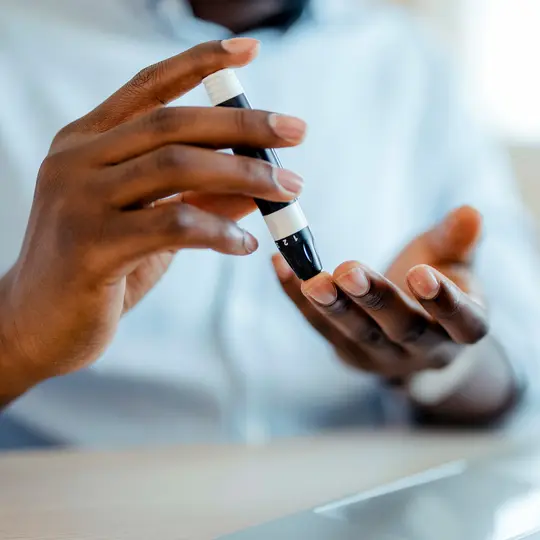1 of 9 / Overview & Types
View All
What Is Diabetes?
Diabetes is a number of diseases that involve problems with the hormone insulin. There is no cure for diabetes.
What Are the Different Types of Diabetes?
There are three major types of diabetes: type 1 diabetes, type 2 diabetes, and gestational diabetes.
What Is Diabetes Insipidus?
Diabetes insipidus causes you to have an almost unquenchable thirst and your body to make a lot of urine.
What Is Gestagenic Diabetes Insipidus?
Gestational DI, or gestagenic diabetes insipidus, is a rare disorder that happens in pregnancy, usually in the third trimester.
2 of 9 / Symptoms & Diagnosis
View All
Signs & Symptoms of Diabetes
The warning signs of diabetes can be so mild that you don't notice them. That's especially true of type 2 diabetes.
Diagnosis of Diabetes
Diabetes diagnostic tests include a fasting plasma glucose test, oral glucose tolerance test, or random plasma glucose test.
Oral Glucose Tolerance Testing
An oral glucose tolerance test (OGTT) shows how well your body handles sugar from foods.
Hemoglobin A1c (HbA1c) Testing
The hemoglobin A1c test is an important blood test that shows how well your diabetes is being controlled.
3 of 9 / Treatment
View All
Understanding Your Diabetes Treatment Options
You cannot treat diabetes on your own. Your doctor will help you make a diabetes treatment plan that is right for you.
Your Diabetes Care Team
Different doctors can help you manage different aspects of your diabetes. Find out who you need on your team.
Types of Insulin
Many forms of insulin treat diabetes, including rapid-acting, short-acting, intermediate-acting, long-acting, and pre-mixed.
Insulin Questions for Your Doctor
Has your doctor prescribed insulin to help manage your type 1 or type 2 diabetes? You’ll want to know how and when to take it.
4 of 9 / Living With
View All
High Blood Sugar (Hyperglycemia)
Blood sugar control is at the center of any diabetes treatment plan. High blood sugar, or hyperglycemia, is a major concern.
Low Blood Sugar (Hypoglycemia)
People with diabetes get hypoglycemia (low blood sugar) when their bodies don't have enough sugar to use as fuel.
Continuous Glucose Monitoring
Continuous glucose monitors are FDA-approved systems that track your blood sugar levels day and night.
How and When to Test Your Blood Sugar
Most people with diabetes need to check their glucose levels regularly. The results help you and your doctor manage those levels.
5 of 9 / Related Conditions
View All
Nerve Pain and Diabetes
Nerve pain caused by diabetes, known as diabetic peripheral neuropathy, can be severe, constant, and hard to treat.
Skin Conditions and Diabetes
Skin conditions related to diabetes are common. Most can be successfully treated before they turn into a serious problem.
Kidney Disease and Diabetes
Diabetic nephropathy -- kidney disease that results from diabetes -- is the No. 1 cause of kidney failure.
Infections and Diabetes
Most infections in people with diabetes can be treated. But you have to be able to spot the symptoms. Learn what to look for.
6 of 9 / Type 2 Diabetes
View AllType 2 Diabetes
Type 2 diabetes is a lifelong disease that keeps your body from using insulin the way it should.
Prediabetes (Borderline Diabetes)
Prediabetes is when your blood sugar level is higher than it should be but not enough for your doctor to diagnose diabetes.
What is Insulin Resistance?
Insulin resistance is when cells in your muscles, fat, and liver don’t respond well to insulin.
Early Signs and Symptoms of Type 2 Diabetes
You might not know that you have type 2 diabetes until it affects your health. Symptoms can come on slowly.
7 of 9 / Type 1 Diabetes
View AllType 1 Diabetes
Type 1 diabetes is a condition in which your immune system destroys insulin-making cells in your pancreas.
Might My Child Have Type 1 Diabetes?
Know the symptoms of type 1 diabetes so you can help keep your child healthy.
Giving Yourself an Insulin Shot for Diabetes
For those with diabetes, an insulin shot delivers medicine into the subcutaneous tissue.
What to Eat When You Have Type 1 Diabetes
It's important to eat a healthy diet when you have type 1 diabetes. That doesn't mean you can't enjoy tasty food.
8 of 9 / Gestational Diabetes
View AllWhat Causes Gestational Diabetes?
Gestational diabetes is high blood sugar that you get only when you're pregnant.
Gestational Diabetes: Can I Lower My Risk?
Although some things mean you're more likely to get gestational diabetes, you can steps to lower your risk.
Pregnancy and Gestational Diabetes Screening
All pregnant women should be screened for gestational diabetes during their pregnancy.
How Is Gestational Diabetes Treated?
If you have gestational diabetes, you'll need to get your blood sugar under control to protect your health and your baby's.
9 of 9 / Appointment Prep
View AllSuggested Reads about Diabetes
FDA Approves First OTC Continuous Glucose Monitor
The Dexcom Stelo Glucose Biosensor System is for adults with or without diabetes who don't use insulin.
Companies Can Claim Yogurt Reduces Diabetes Risk, FDA Says
Yogurt manufacturers can now claim that eating yogurt reduces a person’s risk of type 2 diabetes, the Food and Drug Administration said in a letter of enforcement discretion.
Bariatric Surgery Beats Lifestyle Changes for Type 2 Diabetes
New research shows that patients who had bariatric surgery were significantly more likely to have improved glycemic control, diabetes remission, reduced cholesterol levels, and maintain much of their weight loss for a dozen years, compared to the 96 people treated with medical management and lifestyle changes.
FDA: Avoid Smartwatches That Claim to Measure Glucose Levels
Smartwatches and rings that claim to measure glucose levels without piercing the skin aren’t approved by the FDA and may be inaccurate.
8 million+ Physician Ratings & Reviews
Find Doctors and Dentists Near You
You can also search by physician, practice, or hospital name